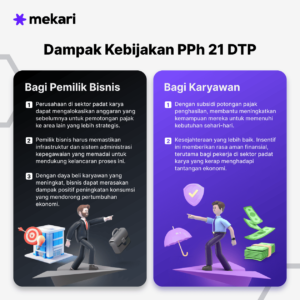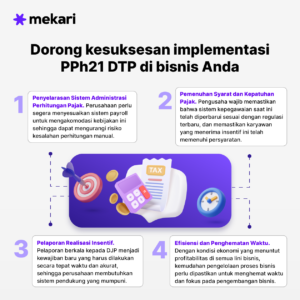Jakarta, 13 Februari 2025 – – The Indonesian government has implemented an Income Tax (PPh) Article 21 incentive, which is fully covered by the government (DTP), for employees earning up to IDR 10 million per month. This policy significantly impacts both business owners and employees, particularly in the footwear, textile, apparel, furniture, leather, and derivative product industries. Download the full policy here.
A Relief or a Challenge?
Effective February 4, 2025, this policy exempts employees from income tax obligations, allowing them to receive their full salary without deductions. It also supports business continuity and accelerates national economic recovery. The introduction of this regulation brings various positive impacts for both employers and employees.

For Employee
- Tax reduction subsidy helps improve their ability to meet daily needs.
- Better financial security, especially for workers in labor-intensive sectors who often face economic challenges.
For Business Owners
- Labor-intensive sector companies can reallocate budget previously spent on tax deductions to more strategic areas.
- Business owners must ensure adequate infrastructure and administrative systems to support a smooth implementation of this process.
- With increased employee purchasing power, businesses can experience the positive effects of higher consumer spending, driving economic growth.
Stevens Jethefer, Head of Business at Mekari Talenta, stated that the implementation of this new regulation provides relief for companies in terms of operational costs. However, on the other hand, it also introduces new challenges for business owners. Companies are required to meet various administrative requirements, including periodic reporting to the Directorate General of Taxes (DJP) regarding the utilization of this incentive. Additionally, they must ensure that payroll and tax systems remain compliant with current regulations and that infrastructure and administrative systems are sufficient to facilitate the smooth implementation of this policy.
“Companies must meet various administrative requirements, including regular reporting on incentive usage to the Directorate General of Taxes (DJP). Additionally, business owners need to ensure that their payroll and tax management systems remain compliant with prevailing regulations,” Stevens explained.
Encouraging the Implementation of New Regulations in Business Systems

The new PPh 21 DTP regulation requires businesses to understand the eligibility criteria for permanent and non-permanent employees, as well as the payment and reporting mechanisms. The main challenge arises in adapting automated payroll systems. To optimize business processes and maintain growth focus, Stevens highlights several key aspects that business owners should consider:
- Alignment of Payroll Tax Calculation Systems – Companies need to promptly adjust their payroll systems to accommodate this policy, reducing the risk of manual calculation errors.
- Compliance with Tax Requirements – Employers must ensure that their HR systems are updated in line with the latest regulations and that employees receiving this incentive meet the necessary criteria.
- Periodic Incentive Reporting – Regular reporting to DJP is a new obligation that must be conducted accurately and on time, requiring companies to have a robust supporting system.
- Efficiency and Time Savings – In an economic climate that demands profitability across all business lines, streamlined business processes are essential to save time and focus on business development.
According to Erna Tjatur, Compensation & Benefit Manager at PT Victoria Care Indonesia, a flexible Software as a Service (SaaS) HR system that supports payroll processes in line with the latest policies will greatly help businesses optimize their growth. Mekari Talenta enables business owners to fulfill their obligations more easily while providing optimal benefits to employees.
“In addition to assisting our HR administrative processes, the Mekari Talenta system adapts agilely to the latest government regulations. This ensures compliance and efficiency in business processes without any worries,” added Erna Tjatur, an HR System user.


